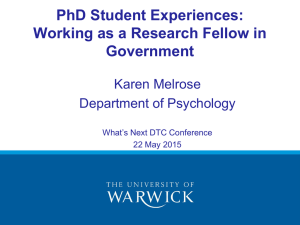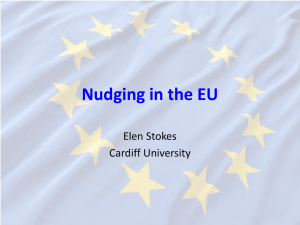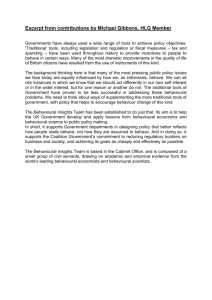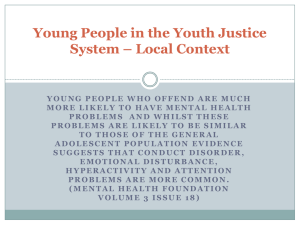Recommended Reading
advertisement
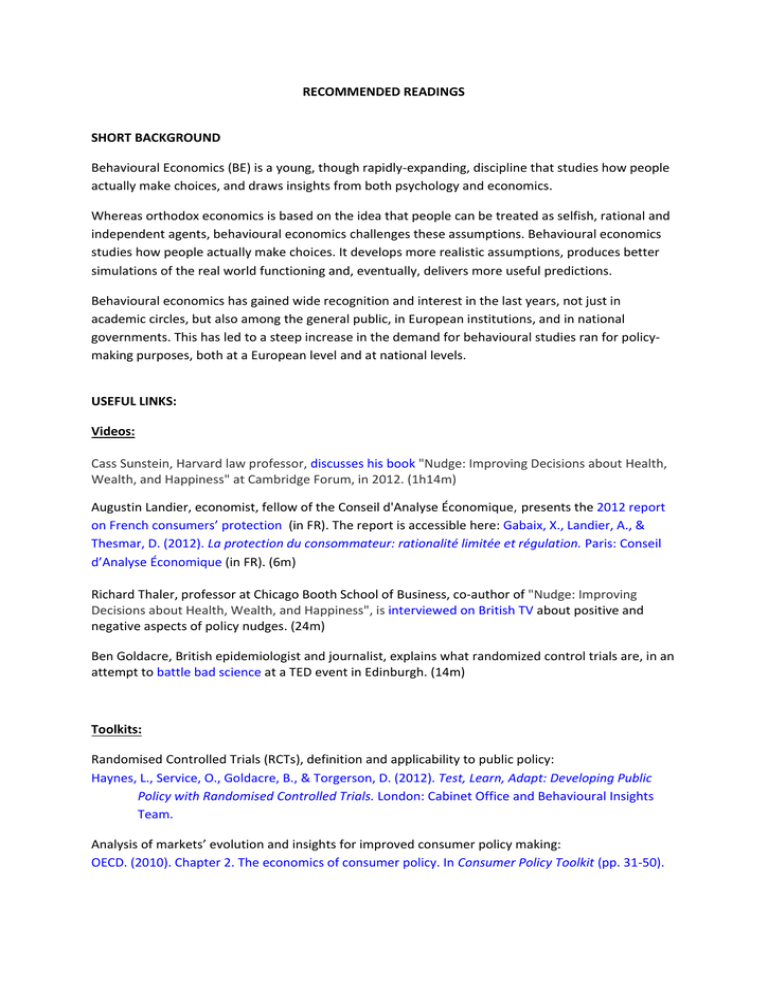
RECOMMENDED READINGS SHORT BACKGROUND Behavioural Economics (BE) is a young, though rapidly-expanding, discipline that studies how people actually make choices, and draws insights from both psychology and economics. Whereas orthodox economics is based on the idea that people can be treated as selfish, rational and independent agents, behavioural economics challenges these assumptions. Behavioural economics studies how people actually make choices. It develops more realistic assumptions, produces better simulations of the real world functioning and, eventually, delivers more useful predictions. Behavioural economics has gained wide recognition and interest in the last years, not just in academic circles, but also among the general public, in European institutions, and in national governments. This has led to a steep increase in the demand for behavioural studies ran for policymaking purposes, both at a European level and at national levels. USEFUL LINKS: Videos: Cass Sunstein, Harvard law professor, discusses his book "Nudge: Improving Decisions about Health, Wealth, and Happiness" at Cambridge Forum, in 2012. (1h14m) Augustin Landier, economist, fellow of the Conseil d'Analyse Économique, presents the 2012 report on French consumers’ protection (in FR). The report is accessible here: Gabaix, X., Landier, A., & Thesmar, D. (2012). La protection du consommateur: rationalité limitée et régulation. Paris: Conseil d’Analyse Économique (in FR). (6m) Richard Thaler, professor at Chicago Booth School of Business, co-author of "Nudge: Improving Decisions about Health, Wealth, and Happiness", is interviewed on British TV about positive and negative aspects of policy nudges. (24m) Ben Goldacre, British epidemiologist and journalist, explains what randomized control trials are, in an attempt to battle bad science at a TED event in Edinburgh. (14m) Toolkits: Randomised Controlled Trials (RCTs), definition and applicability to public policy: Haynes, L., Service, O., Goldacre, B., & Torgerson, D. (2012). Test, Learn, Adapt: Developing Public Policy with Randomised Controlled Trials. London: Cabinet Office and Behavioural Insights Team. Analysis of markets’ evolution and insights for improved consumer policy making: OECD. (2010). Chapter 2. The economics of consumer policy. In Consumer Policy Toolkit (pp. 31-50). National initiatives and reports: Recently documented insights into how to increase charitable giving: Cabinet Office and Behavioural Insights Team. (2013). Applying behavioural insights to charitable giving. London. A comprehensive report on UK’s Behavioural Insights Team’ activity in 2011-12: Haynes, L., Service, O., Goldacre, B., & Torgerson, D. (2012). Test, Learn, Adapt: Developing Public Policy with Randomised Controlled Trials. London: Cabinet Office and Behavioural Insights Team. A concise description of simple nudges to induce greener behaviour: Centre d’analyse stratégique. (2011). “Green nudges”: new incentives for ecological behaviour. Paris. An extensive investigation into how behavioural and neuroscience tools can help fight nicotine addiction and obesity: Oullier, O., & Sauneron, S. (2010). Improving public health prevention with behavioural, cognitive and neuroscience. Paris: Centre d'analyse stratégique. Cheap and smart ways to improve health: Cabinet Office and Behavioural Insights Team. (2010). Applying behavioural insight to health. London. Newspaper articles: Some areas where consumer (behaviourally based) protection initiatives could make a big difference… Kay, J. (2011, July 6). The $10 minibar beer is no basis for capitalism. Financial Times. ...and others, where relying solely on behavioural economics insights is not enough: Loewenstein, G., & Ubel, P. (2010, July 15). Economics Behaving Badly. The New York Times, p. 31. Conferences: European Commission (2010). Behavioural Economics, so What: Should Policy-Makers Care? European Commission (2008). How Can Behavioural Economics Improve Policies Affecting Consumers? Mulholland, J. P. (2007). Summary report on the FTC behavioral economics conference. Washington DC: Free Trade Commission. Books: An exploration of the policy relevance of behavioural science to our social and political lives: Shafir, E. (Ed.). (2013). The Behavioral Foundations of Public Policy. New Jersey: Princeton University Press. A ground-breaking tour of the mind to explain the two systems that drive the way we think: Kahneman, D. (2013). Thinking, Fast and Slow. New York: Farrar, Straus, Giroux. How to achieve improved policy outcomes at a low cost, through behavioural changes: Dolan P., Hallsworth M., Halpern D., King D. & Vlaev I. (2010). Mindspace: Influencing Behaviour through Public Policy. London: Institute for Government and the Cabinet Office. Choices—how we make them and how we can make better ones: Thaler, R. H., & Sunstein, C. R. (2009). Nudge: Improving Decisions About Health, Wealth, and Happiness. London: Penguin Books. Legislation: Guidance to inform the use of disclosure and simplification tools in the regulatory process: Sunstein, C. R. (2010). New US Open Government Directive: Disclosure and Simplification as Regulatory Tools. Washington DC: Office of information and regulatory affairs.
